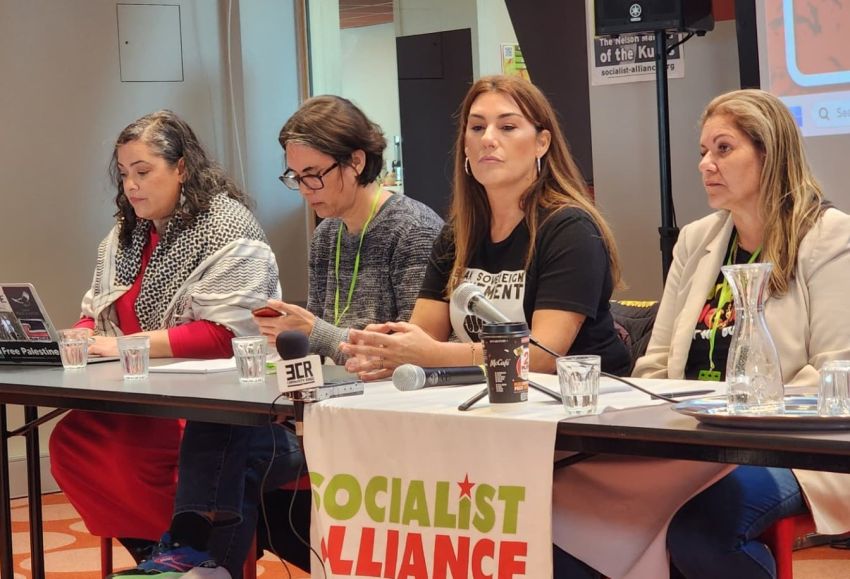
In the context of racist far-right marches — including attacks on First Nations-led Camp Sovereignty — the recent Ecosocialism 2025 conference in Naarm/Melbourne featured a panel of four First Nations women deeply involved in the struggle for sovereignty.
Gunnai, Gunditjmara and Djab Wurrung activist Lidia Thorpe, serving as a Victorian independent senator, highlighted the ongoing colonial processes of Aboriginal child removals, deaths in custody and poverty.
She drew parallels between the colonial genocide of Aboriginal people and Israel’s genocide against Palestinians. “That’s why we stand in solidarity with our brothers and sisters in Palestine, because we do know what it’s like.”
Thorpe condemned the major parties’ deportation agendas and the Anthony Albanese government’s role in boosting racism through its demonisation and inhumane treatment of migrants, including its recently passed anti-refugee laws.
Thorpe highlighted the entrenchment of white supremacy in Australia, describing parliament as a “violent” place that serves to uphold white privilege, racism and ongoing colonisation.
Arrernte woman Celeste Liddle humorously recounted her experience growing up in a family of activists, including attending the bicentenary protests against colonialism as a child and seeing her grandmother on television calling a politician a “dingo” at a protest camp opposing the damming of the Todd River in the Northern Territory.
Liddle, a longtime activist and union coordinator, criticised the defeated Voice to Parliament for lacking real power and any guarantee of a democratic structure. “It was framed as an addressing of the racism of the structures,” Liddle said, “when the constitution itself, that they were trying to write us into, remains deeply racist.”
She cited examples, such as Section 44 of the Constitution disqualifying dual citizens from running for parliament, which was introduced to prevent migrants from being elected as MPs.
Liddle said racism persists because “Australia is yet to actually deal with its history”. She called for a “full-blown truth-telling agenda” about Australia’s colonial history and ongoing systemic injustices.
Mardudhunera woman Raelene Cooper, the founder of Save our Songlines, an Aboriginal-led campaign coordinated by Traditional Custodians of Murujuga (Burrup Peninsula) in Western Australia’s Pilbara region to protect their Country, gave a powerful testimony of the battles to stop Murujuga cultural sites — containing more than 2 million ancient rock artworks (petroglyphs) — from being destroyed by Woodside and other corporations for fossil fuel and fertiliser projects.
Cooper described the experience of presenting the case internationally at the United Nations and UNESCO World Heritage nomination process, in a bid to win protections for Murujuga.
She condemned the state and federal governments’ support for projects currently destroying Murujuga, such as the Perdaman fertiliser plant.
The federal government delayed heritage applications for Murujuga made by Cooper — delays ruled as “unreasonable” by the Federal Court in August — lobbied internationally to weaken UNESCO protections and continued approving new destructive projects.
Cooper spoke of the emotional toll and trauma of fighting to stop the destruction of the place integral to her identity and history. She is, however, determined to continue, advocating ongoing resistance, community solidarity and the importance of passing on cultural knowledge and activism to future generations.
Māori woman Dr Arama Rata — a researcher, writer and organiser from Aotearoa New Zealand — explained settler colonialism as a racialised, genocidal process that imposes “white patriarchal sovereignty”.
This logic persists, Rata said, despite attempts to rebrand colonialism — through “false multiculturalism” in Australia and “treaty exceptionalism” in Aotearoa — which grant symbolic rights but no substantive decolonisation.
The crises of capitalism have given rise to an emboldened far right, Rata said, which seeks to “re-entrench unequal power through genocidal violence against externalised threats, but also through the scapegoating of Indigenous and migrant communities within settler states”.
She pointed to examples of white nationalist and Christian Zionist groups in Aotearoa that oppose Māori sovereignty and support Zionist settler-colonialism in Palestine.
Rata provided a valuable insight into the dynamics between First Nations movements and left movements in Aotearoa, highlighting how the necessity of anti-colonial struggle has been brought into even sharper focus by Israel’s genocidal violence in Gaza.
She called for “Indigenous-led anti-colonial ecosocialism” and “a new political project that incorporates Land Back and reparations as core to seizing the means of production and redistributing wealth”.
Liddle emphasised the need to build collective power — particularly in unions — which she said has the potential to stop systemic violence, such as Israel’s genocide in Gaza.
Rata addressed the exclusion of non-Indigenous people of colour from treaty spaces in Aotearoa, calling for education and solidarity that acknowledges complex colonial histories.
Responding to a question about Aboriginal health and colonialism, Thorpe said: “It’s a known genocide tactic to keep us unwell. In terms of disease, they brought smallpox, but our people are still dying from preventable disease.”
All speakers stressed the importance of truth-telling and Indigenous-led collective action to dismantle white supremacy and advance First Nations sovereignty.
[Watch the full livestream here.]